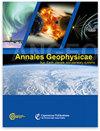利用 EUHFORIA 对 2015 年 6 月 21 日和 25 日的 CME 进行调查
IF 1.9
4区 地球科学
Q3 ASTRONOMY & ASTROPHYSICS
引用次数: 0
摘要
摘要在这项研究中,欧洲日光层抛射信息资产(EUHFORIA)被用作一个数学模型,以研究日冕物质抛射(CMEs)如何在并非所有地区都一致的太阳风流中移动,同时考虑到三个维度和随时间的变化。对2015年6月21日和25日发生的两次特定日冕物质抛射的传播模式进行了磁流体动力(MHD)模拟分析。针对日光层内部区域的 EUHFORIA 模拟包含了与 CME 和边界太阳风相关的条件。利用来自 WIND 和 OMNI 航天器的数据进行的比较研究显示,EUHFORIA 模型提供了适度精确的描述。该研究强调,在决定对地球的影响方面,CMEs 的相互作用起着重要作用,同时强调它们的初始速度虽然相似,但影响较小。此外,EUHFORIA 数值模型与德国 GFZ 研究中心的研究结果一致,这意味着 EUHFORIA 也有能力计算和预测 CME 对地球的影响。本文章由计算机程序翻译,如有差异,请以英文原文为准。
The investigation of June 21 and 25, 2015 CMEs using EUHFORIA
Abstract. In this research, the EUropean Heliosphere FORecasting Information Asset (EUHFORIA) is used as a mathematical model to examine how coronal mass ejections (CMEs) move through a solar wind flow that is not consistent in all areas, taking into account three dimensions and changes over time. Magnetohydrodynamic (MHD) simulations were conducted to analyze the propagation patterns of two specific CMEs that occurred on June 21 and 25, 2015. The EUHFORIA simulations for the inner region of the heliosphere involve incorporating conditions related to CMEs and the solar wind at the boundaries. Comparative examination using data from the WIND and OMNI spacecrafts reveals that the EUHFORIA model offers a moderately precise depiction. The study highlights that interactions of CMEs play a significant role in determining their impact on Earth, highlighting that their initial speeds, while similar, are less influential. Besides, the EUHFORIA numerical model align with the findings of the GFZ German research center, this implies that EUHFORIA has also the capability to compute and potentially forecast the impact of CMEs on the Earth.
求助全文
通过发布文献求助,成功后即可免费获取论文全文。
去求助
来源期刊

Annales Geophysicae
地学-地球科学综合
CiteScore
4.30
自引率
0.00%
发文量
42
审稿时长
2 months
期刊介绍:
Annales Geophysicae (ANGEO) is a not-for-profit international multi- and inter-disciplinary scientific open-access journal in the field of solar–terrestrial and planetary sciences. ANGEO publishes original articles and short communications (letters) on research of the Sun–Earth system, including the science of space weather, solar–terrestrial plasma physics, the Earth''s ionosphere and atmosphere, the magnetosphere, and the study of planets and planetary systems, the interaction between the different spheres of a planet, and the interaction across the planetary system. Topics range from space weathering, planetary magnetic field, and planetary interior and surface dynamics to the formation and evolution of planetary systems.
 求助内容:
求助内容: 应助结果提醒方式:
应助结果提醒方式:


